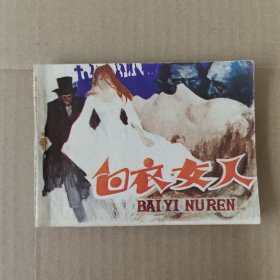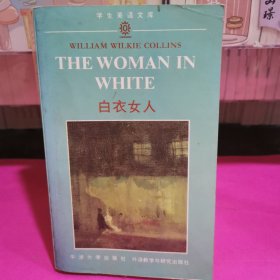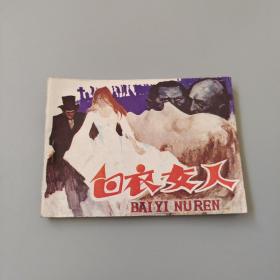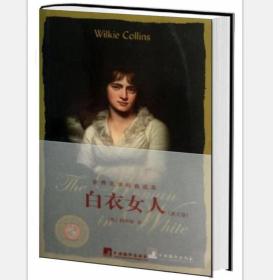
白衣女人
全新正版 极速发货
¥ 26.97 4.7折 ¥ 58 全新
库存3件
广东广州
认证卖家担保交易快速发货售后保障
作者(英)柯林斯 著作
出版社中央编译出版社
ISBN9787511715845
出版时间2013-05
装帧平装
开本32开
定价58元
货号1200783481
上书时间2024-11-22
- 最新上架
商品详情
- 品相描述:全新
- 商品描述
-
作者简介
柯林斯(Wilkie Collins)(1824-1889), was an English novelist, playwright, and author of short stories. He was hugely popular during the Victorian era and wrote 30 novels, more than 60 short stories, 14 plays, and over 100 nonfiction pieces. His best-known works are The Woman in White, The Moonstone, Armadale and No Name.
Collins predicted the concept of the Cold War nuclear era, "I begin to believe in only one civilizing influence-the discovery one of these days of a destructive agent so terrible that War shall mean annihilation and men's fears will force them to keep the peace."
目录
THE FIRST EPOCH
THE STORY BEGUN BY WALTER HARTRIGHT
THE STORY CONTINUED BYVINCENT GILMORE
THE STORY CONTINUED BY MARIAN HALCOMBE
THE SECOND EPOCH
THE STORY CONTINUED BY MARIAN HALCOMBE
POSTSCRIPT BY A SINCERE FRIEND
THE STORY CONTINUED BY FREDERICK FAIRLIE, ESQ.OF
LIMMERIDGE-HOUSE
THE STORY CONTINUED BY ELIZA MICHELSON
THE STORY CONTINUED IN SEVERAL NARRATIVES
THE THIRD EPOCH
THE STORY CONTINUED BY WALTER HARTRIGHT
THE STORY CONTINUED BY MRS. CATHERICK
THE STORY CONTINUED BY WALTER HARTRIGHT
THE STORY CONTINUED BY ISIDOR, OTTAVIO, BALDASSARE
FOSCO
THE STORY CONCLUDED BY WALTER HARTRIGHT
内容摘要
夏日的一个傍晚,年轻的艺术教师沃尔特路遇一位从疯人院逃出白衣女人,协助其逃至伦敦,发觉她与自己的学生劳拉长相相似。沃尔特与劳拉陷入热恋,而劳拉原已许字珀西瓦尔·格莱特,沃尔特只好抽身他往。谁想格莱特骗得与劳拉成亲,意在谋取钱财,而名为安娜的白衣女人从前也是陷入格莱特的圈套,被送进疯人院的。不久,安娜病逝,格莱特暗中偷换二者的身份,以劳拉的名义葬埋安娜,而以安娜的身份将劳拉关进了疯人院……作者柯林斯是英国19世纪与狄更斯齐名的文学大师,《白衣女人》开创了现代惊悚小说和侦探小说的先河,而书中的重要人物沃尔特·哈特莱特也成为此后诸多侦探形象竞相效仿的鼻祖。
精彩内容
Without attempting to answer those questions decisively, I may at least record that I never saw my mother and my sister together in Pesca's society, without finding my mother much the younger woman of the two.On this occasion, for example, while the old lady was laughing heartily over the boyish manner in which we tumbled into the parlour, Sarah was perturbedly picking up the broken pieces of a teacup, which the Professor had knocked off the table in his precipitate advance to meet me at thedoor.
"I don't know what would have happened, Walter," said my mother, "if you had delayed much longer. Pesca has been half mad with impatience,and I have been half mad with curiosity. The Professor has brought some wonderful news with him, in which he says you are concerned; and he has cruelly refused to give us the smallest hint of it till his friend Walter appeared."
"Very provoking: it spoils the Set," murmured Sarah to herself,mournfully absorbed over the ruins of the broken cup.
While these words were being spoken, Pesca, happily and fussily unconscious of the irreparable wrong which the crockery had suffered at his hands, was dragging a large arm-chair to the opposite end of the room, so as to command us all three, in the character of a public speaker addressing an audience. Having turned the chair with its back towards us, he jumped into it on his knees, and excitedly addressed his small congregation of three from an impromptu pulpit.
"Now, my good dears," began Pesca (who always said "good dears" when he meant "worthy friends"), "listen to me. The time has come--I recite my good news--I speak at last."
"Hear, hear!" said my mother, humouring the joke.
"The next thing he will break, mamma," whispered Sarah, "will be the back of the best arm-chair."
"I go back into my life, and ! address myself to the noblest of created beings," continued Pesca, vehemently apostrophising my unworthy self over the top rail of the chair. "Who found me dead at the bottom of the sea (through Cramp); and who pulled me up to the top; and what did I say when I got into my own life and my own clothes again?"
"Much more than was at all necessary," I answered as doggedly as possible; for the least encouragement in connection with this subject invariably let loose the Professor's emotions in a flood of tears.
"I said," persisted Pesca, "that my life belonged to my dear friend,Walter, for the rest of my days--and so it does. I said that I should never be happy again till I had found the opportunity of doing a good Something for Walter--and I have never been contented with myself till this most blessed day Now," cried the enthusiastic little man at the top of his voice, "the overflowing happiness bursts out of me at every pore of my skin, like a perspiration; for on my faith, and soul, and honour, the something is done at last, and the only word to say now is--Right-all-right!"
It may be necessary to explain here that Pesca prided himself on being a perfect Englishman in his language, as well as in his dress, manners,and amusements. Having picked up a few of our most familiar colloquial expressions, he scattered them about over his conversation whenever they happened to occur to him, turning them, in his high relish for their sound and his general ignorance of their sense, into compound words and repetitions of his own, and always running them into each other, as if they consisted of one long syllable.
"Among the fine London Houses where I teach the language of my native country," said the Professor, rushing into his long-deferred explanation without another word of preface, "there is one, mighty fine,in the big place called Portland. You all know where that is? Yes, yes--course-of-course. The fine house, my good dears, has got inside it a fine family A Mamma, fair and fat; three young Misses, fair and fat; two young Misters, fair and fat; and a Papa, the fairest and the fattest of all, who is a mighty merchant, up to his eyes in gold--a fine man once, but seeing that he has got a naked head and two chins, fine no longer at the present time. Now mind! I teach the sublime Dante to the young Mi
相关推荐
— 没有更多了 —






















以下为对购买帮助不大的评价